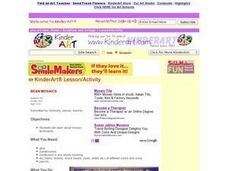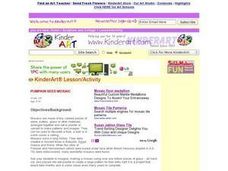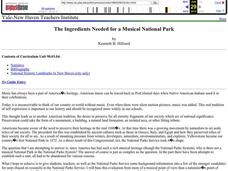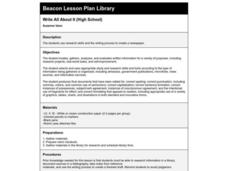Curated OER
The Alphabet is Historic
Students describe how the Phoenicians, Greeks and Romans passed down the alphabet through the generations. They compare and contrast the letters from early alphabets to the one of today and discuss how they are different. Using a map,...
Curated OER
Discovering Math: Concepts in Algebra
Students learn that speed is a function of time and distance, a quadratic equation can be used to figure out the path of fireworks, a photographer can use Algebra to figure out how many rolls he can afford if he needs twice as much of...
Curated OER
Pumpkin Seeds Mosaic
Students examine the history of mosaics. They follow instructions to create their own pumpkin seed mosaic. They also bake some of the seeds to enjoy as a treat.
Curated OER
Goddesses Are Personifications Too!
Students explore the use of personification as a way of expressing ideals. They transfer this understanding to the present by creating an allegorical depiction of a contemporary ideal or value inspired by precedents in the...
Curated OER
Mosaic: Press-in Method
Students create individual press-in mosaics using a variety of bought and found objects.
Curated OER
Greek mythology (characteristics and features)
Students recognize the features and characteristics of myths, the role myths played in Greek culture, and choose a writing project. In this Greek mythology lesson, students are introduced to Greek mythology and work in cooperative...
Curated OER
Copper Tooling
Students examine different examples of Mycenaean masks. They discuss the history of the masks and why they might have been made. They give their opinions and their responses are recorded.
Curated OER
It's All in the Translation
High schoolers compare and contrast translations of Greek literature. In this dramatic literature lesson, students read and perform passages from four different translations of Euripides's Hecuba. High schoolers discuss how the...
Curated OER
Greek Mythology: All in the Family
Twelfth graders compare/contrast the Greek myth to explain an aspect of nature. They create an explanatory myth about some aspect of nature and design a mythological business card using Microsoft Word.
Curated OER
Being in the Noh: An Introduction to Japanese Noh Plays
Students analyze the conventions used in Noh plays and write an introduction to a Noh play of their own. In this Noh play lesson, students identify the conventions of the Noh form and analyze the realizations the main character achieves....
Curated OER
Introduction to Greek Theatre
Students create a tableau for a Greek myth. In this introduction to Greek theatre instructional activity, students discuss the history of Greek theatre and tableau and complete a handout. Students work in groups to choose a...
Curated OER
Keith Haring Olympics
Pupils create a mural in the Keith Haring style of olympic sports. In this olympic mural lesson plan, students complete this mural on school grounds.
Curated OER
A Dash of Folk, A Pinch of Fairy Recipes for Playmaking
Students examine the importance of oral traditions while reading various fairy and folk tales. Given a piece of clay, they can mold it into any shape they want and pass it to their neighbor which keeps building the object. They use...
Curated OER
From Fact To Fiction: Moby Dick
Students examine what makes a tragic hero and whether Captain Ahab fits the criteria. In this literature lesson, engage in group discussions and examine Captain Ahab from the novel Moby Dick. They will then engage in a debate...
Curated OER
Guidelines for Governing: Utopia and The Prince
Students explore the power of the Church in government. In this literature lesson, students read Sir Thomas More's Utopia and Niccolo Machiavelli's The Prince. Students respond to questions regarding the works and discuss them.
Curated OER
Primary Structural Forms: Post and Beam
Students examine the three primary structural forms of architecture. They view photos, take a walking tour of their community, conduct strength tests of post, beam, and arch construction, and analyze the test results.
Curated OER
The Olympic Games
Students research the history of the Olympics and the various countries that have hosted the games. They obtain information about some of the sports featured in the Olympics. Students then create a brochure using Microsoft Publisher.
Curated OER
The Ingredients Needed for a Musical National Park
Students identify musical sites that are worthy of being included as units of the National Parks System. They anthologize American music from primitive times to today.
Curated OER
What Is the History of the Consumption of Rice?
Sixth graders research the history of rice consumption. In this rice consumption lesson, 6th graders read a study guide and answer comprehension questions about two rice dishes and rice cultivation.
Curated OER
Coin Content
Learners calculate ancient Greek coin values as compared to their weight, and equivalence in grain. They then determine their worth today. They convert metric to U.S. customary weight systems.
Curated OER
Write All About It
Fourth graders use research skills and the writing process to create a newspaper. Although students work in groups to complete the final draft of the newspaper, each student is responsible for doing his or her own research and writing...
Curated OER
Teaching the Hindu-Buddhist Tradition in East Asian Culture Through Asian Literature and Film
Students explore various intellectual traditions which dominate human history through a variety of contemporary pieces of literature which exemplify the traditions. Biblical monotheism, Greek rationalism, Hinduism, Buddhism, Confucianism...
Curated OER
Garden Guard
Students design and create scarecrows. They write descriptively about the scarecrow for a classroom scarecrow show.

























